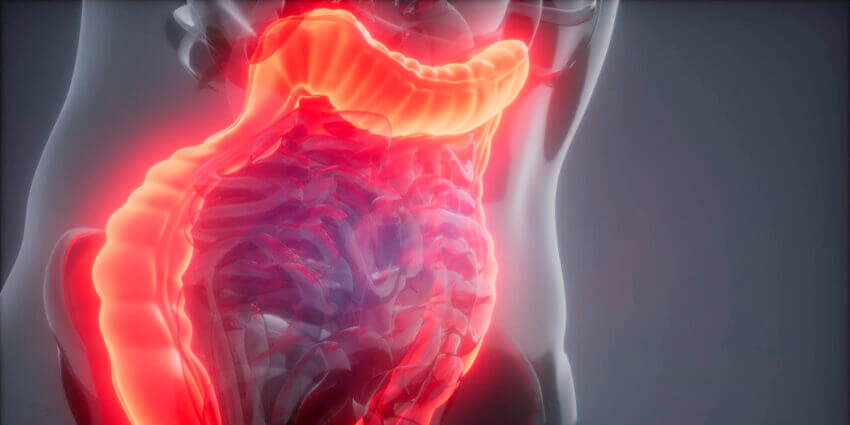Small Intestinal Bacterial Overgrowth (SIBO) isn’t simply inconvenient, it may actually be dangerous. Studies show that bad bacteria in the small intestine can lead to problems with the gallbladder, liver, and pancreas (all connect to the small intestine, so that makes sense). Pancreatitis (inflammation of the pancreas) can even lead to pancreatic cancer! It can also lead to chronic diarrhea, vitamin / mineral deficiencies and fat malabsorption. The toxins (such as LPS) produced by the SIBO bacteria can cause leaky gut (intestinal permeability), can get into the bloodstream causing a host of problems (everything from histamine intolerance, brain fog, Crohn disease, to possibly even Parkinson’s!) This same bacteria in the colon can cause a different set of problems, even without telltale symptoms (bacteria in the colon can also translocate to the small intestine. This is a common cause of SIBO). SIBO is certainly not harmless.
Recent studies have shown a clear connection between SIBO and acute pancreatitis (AP) as well as hyperglycemia (metabolic disease or Type II diabetes). Pancreatitis is not something you want to mess with, it can cause life long health issues, including gut issues and nutritional malabsorption. It can also lead to chronic pancreatitis and pancreas cancer. The two most common bacterial species involved are Escherichia coli and Klebsiella pneumoniae. This bacteria enters our food and water supply mostly from livestock and raw vegetables (mostly from animal contamination in the fields). Under cooked beef (especially hamburger is a common source) as well as raw milk. Cross contamination in butchering and the dairy process is common. If you feed your dogs or cats raw meat they can become infected (perhaps even asymptomatically) and pass this to you. Antibiotic resistant strains are also very common. This is especially problematic with cows processed in modern concentrated animal feeding operations (CAFO). Avoiding coliform bacteria is very important. In today’s world we should suspect all raw meat and be careful of cross contamination.
SIBO has been associated with pancreatitis, a sometimes deadly condition.
(OGTT=oral glucose tolerance test, H2=hydrogen, CH4=methane, AP=acute pancreatitis)
“levels of total breath H2 and CH4 in patients with AP were significantly higher than those in controls. Serum glucose levels during OGTT were higher in SIBO-positive patients than in SIBO-negative patients. Although the mechanism underlying SIBO in patients with AP is unclear, there is increasing evidence of a clear association between intestinal bacteria and AP” — PubMed ID#31689699
This appears to be a two way street. SIBO can lead to pancreatitis, but pancreatitis can also lead to SIBO, or make it worse. Because of pancreatitis’ effects on bile it most certainly will lead to a disruption of bacteria (dysbiosis) of the bacteria in the colon as well.
“patients with moderately severe or severe AP have a higher incidence of SIBO than those with mild AP… Breath H2 and CH4 are known to be produced from unabsorbed carbohydrate in the small bowel through bacterial fermentation. In patients with AP, digestion and absorption of carbohydrate may be reduced as their pancreatic exocrine function is reduced.” — Journal of Breath Research
Studies have directly linked SIBO to gastrointestinal cancer.
“In a Chinese cohort, SIBO is associated with gastrointestinal cancer. Based on the preliminary intervention study, we conclude that probiotic intervention combats SIBO in patients with gastrointestinal cancer and alleviates its symptoms.” — PubMed ID#27210778
Many cases of SIBO are caused by either the over consumption of carbohydrates (or, more specifically, sugar) or some level of pancreatitis. If the pancreas is impaired it is not producing enough enzymes to break down carbohydrates and sugars, this means that you malabsorb them. You can have similar issues if the bile ducts are inflamed or blocked. When this happens the carbohydrates will be available to feed bad bacteria. Good bacteria in the colon consume fibers (and similar non-human digestible foods); lets be clear, these sugars feed unwanted bacteria.
It should be noted at this point that the primary cause of pancreatitis is alcohol consumption. It has been known for many years that “excess” alcohol consumption can lead to pancreatitis. Combining alcohol (even in moderation) and SIBO can lead to additional pancreatic inflammation and damage. Different people can tolerate different levels of alcohol consumption; some people probably shouldn’t drink at all (this has little to no relation to your propensity for alcoholism).
“Genetics plays an important role in pancreatitis susceptibility, progression and severity… at lease one of 5 established pancreatitis risk genes were identified… pancreatic inflammation is not the disorder: it is the consequence of multiple disorders that cause injury and inflammation” — PubMed ID#PMC3837429
E.Coli bacteria is a common cause of SIBO and has been implicated in intestinal permeability and inflammation. This has been associated with leaky gut, gallbladder issues, liver infections, and pancreatitis.
“E. coli K12 under compromised in vitro milieu disrupted the intestinal barrier functions by decreasing the expression of important tight junction genes along with the altered distribution of associated proteins that increased the intestinal permeability” — PubMed ID#31112772
E.Coli bacteria produce an endotoxin called lipopolysaccharide (LPS). Several research studies have implicated LPS in intestinal permeability (and a wide range of health conditions).
“these studies show for the first time that LPS causes an increase in intestinal permeability via an intracellular mechanism involving TLR-4–dependent up-regulation of CD14 membrane expression. These studies have shown that normalization of intestinal barrier in patients with active Crohn’s disease predicts prolonged clinical remission, whereas a persistent increase in intestinal permeability portends poor clinical outcome with rapid recurrence of the disease. LPS, at physiologically relevant concentrations, causes an increase in intestinal permeability and could play an important role in further deterioration and prolongation of intestinal TJ barrier defect in intestinal permeability disorders and inflammatory diseases of the gut.” — PubMed ID#PMC3562736
This article just scratches the surface of problems caused by SIBO and its associated bacterial toxins. It is clear that SIBO (especially SIBO-D) can be dangerous and should always be addressed. But there are things that can be done about it. The Gut Health Protocol is a good place to start; Phage Complete can also be used to help rebalance the microbiome and eliminate some of the more problematic bacteria, Phage Complete is especially effective at removing e.Coli bacteria. An imbalance of microbiota in the gut should always be addressed.
| These statements have not been evaluated by the Food and Drug Administration. This product is not intended to diagnose, treat, cure, or prevent any disease. |
All images posted by John Herron are either "Copyrighted John Herron", or are copyrighted by someone else and are used under license. So please don’t use them elsewhere, you’ll get in trouble.


 Phage Complete comes with a full 30 day money back guarantee, for U.S. purchases this includes the original shipping charges to you!
Phage Complete comes with a full 30 day money back guarantee, for U.S. purchases this includes the original shipping charges to you!